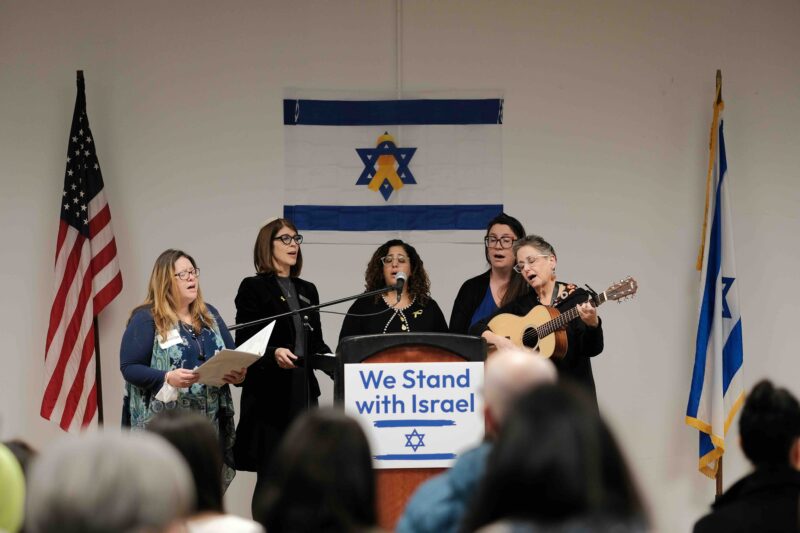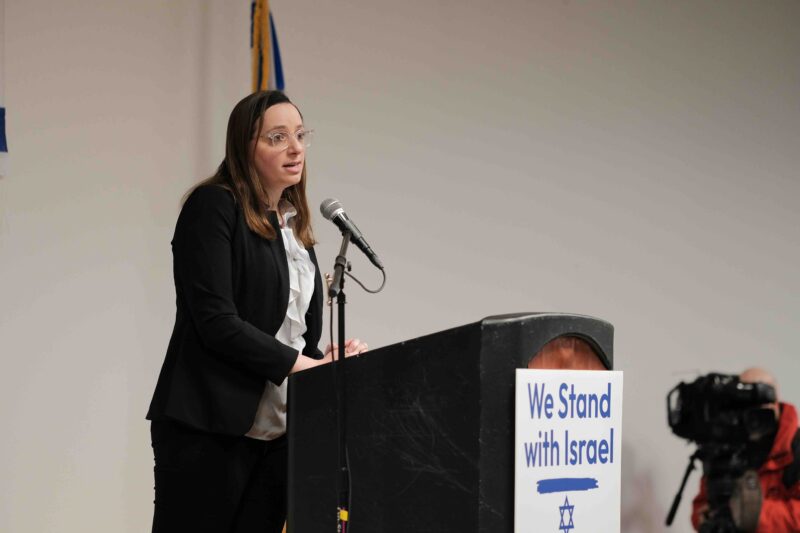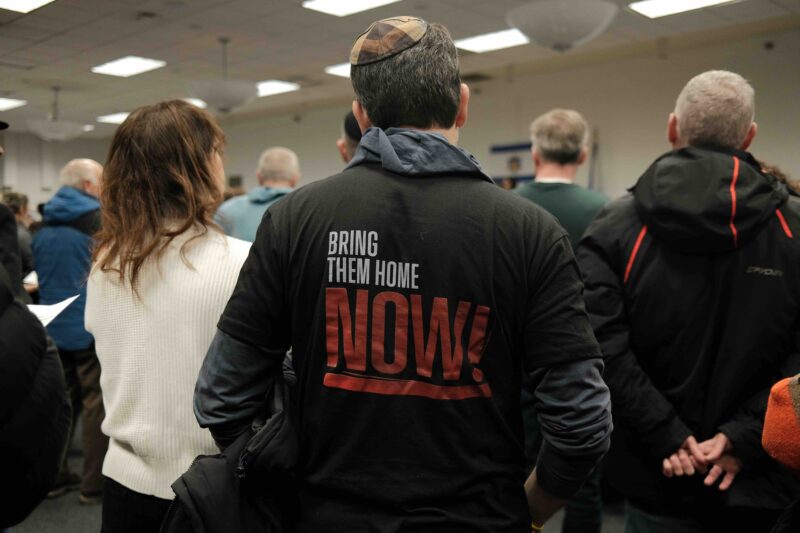Over 200 members and friends of the Twin Cities Jewish community gathered at the Barry Family Campus on Thursday evening for a vigil after the bodies of three hostages were returned to Israel by Hamas, the Gaza-based terror group.
The prevailing feelings at the Twin Cities vigil were shock and exhaustion. This is the first return of hostage bodies since Israel and Hamas agreed to a ceasefire and hostage deal in mid-January, putting a stop to 14 months of war. So far only living hostages had been released by the terror group.
“We can’t always accomplish what we truly wish we could,” said Rabbi David Locketz, senior rabbi at Bet Shalom Congregation in Minnetonka.
“We can’t bring the captives home through words of prayer,” he said. “We certainly cannot remove the pain from the mourners who’ve lost so much in these last 503 days. But we can provide support for one another here in our corner of the Jewish world.”
The vigil was co-organized by the Minneapolis and St. Paul Jewish Federations, the Minnesota Rabbinical Association, the Minnesota Cantors Association, and the Jewish Community Relations Council of Minnesota and the Dakotas.
Vigil speakers addressed the pain many Jews are feeling, while reaching – almost blindly, with little other than faith to support the effort – to the need for hope and renewal, for some light in the darkness.

Twin Cities cantors sing during the vigil (Lev Gringauz/TC Jewfolk)
Shiri Bibas and her children, then-four-year-old Ariel and nine-month-old Kfir, were taken by Hamas from Kibbutz Nir Oz during its brutal Oct. 7, 2023, rampage in southern Israel.
In the 503 days since then, they became a symbol of Hamas’ cruelty and cowardice, with many wondering at the hatred needed to take hostage a mother and her babies.
Friends and relatives of the Bibas family held out hope they would come back alive. Israelis and Jews around the world prayed for their safe return.
Instead, Ariel and Kfir arrived in black coffins plastered with Hamas propaganda, paraded around at a grotesque ceremony by the terror group before a handoff with the Red Cross.
“As the rain fell on the caskets in Gaza, I imagined that God was crying, like each of us unable to hold back their tears,” said Rabbi Rachel Rubenstein, of the Temple of Aaron synagogue in St. Paul.
“But from the rain of God’s tears also comes sustenance and life,” she said. “Each of us has at least a teaspoon of love, and it is our moral imperative to use it to cultivate hope, and to work together to extinguish the flames of hatred that are burning our world.”
The body of Shiri Bibas was also supposed to be returned. But Israel could not identify the body that Hamas said was Shiri’s – it does not match her DNA. The news created an uproar in Israel, and demands for Hamas to fulfill its obligation under the current ceasefire and hostage deal to return Shiri’s body.
Hamas claimed in Nov. 2023 that the family had been killed by an Israeli airstrike, though no evidence was provided. Israel identified the children’s bodies as having been murdered in Nov. 2023 while being held hostage.
Kan Radio reported that Hamas locked the coffins and gave the Red Cross keys that don’t open them. Times of Israel reports that Hamas even put propaganda material inside the coffins for Israelis to find.
The body of 84-year-old Oded Lifshitz, a co-founder of Kibbutz Nir Oz, was also returned. Lifshitz had been a journalist and peace activist, helping to drive Palestinian children from Gaza to Israeli hospitals for treatment.
His return also underlines the mindless violence of Oct. 7 – targeted at a group of Israelis perhaps most sympathetic to Palestinians.

Rabbi Rachel Rubenstein (Lev Gringauz/TC Jewfolk)
Jim Cohen, CEO of the Minneapolis Jewish Federation, recalled bringing Minneapolis Jews on a trip to Israel in February 2024, where they met Lifshitz’s grandchildren.
“It is now clear that the reunion for which they hoped and prayed will never come to fruition,” he said. “To think that Oded’s fate was likely already sealed as we sat there with his family, is yet another example of the cruelty and inhumanity of the enemy Israel faces.”
Israelis gathered along the route of the returning hostage bodies. The prevailing sentiment amid the grief: That this was a failure of each and every Israeli. That the Bibas family and Lifshitz should still be alive.
Mourners have taken to the color orange as a symbol for the red-headed Bibas family, and Batman’s famous emblem to commemorate Ariel’s love for the superhero (who happens to be canonically Jewish, and created by Jewish artists). “Orange is the new black” read at least one Israeli sign.
Israeli Prime Minister Benjamin Netanyahu said in a video message that “we all ache with pain that is mixed with rage. We are all furious at the monsters of Hamas…[Israel must] settle the score with the vile murderers – and we will settle the score.”
“We will bring back all our hostages, destroy the murderers, eliminate Hamas, and together – with God’s help – we will secure our future,” Netanyahu said, according to the Times of Israel.
The future of the ceasefire and hostage deal is unclear. Some reports say that Israel is pursuing stage two of the deal, meant to fully end the Israel-Hamas war in exchange for the release of all hostages, dead and alive.
Conflicting reports from anonymous Israeli officials say U.S. President Donald Trump is backing a return to war, and that Israel will not continue the deal.
Hamas took a total of 251 Israelis hostage on Oct. 7. Six living hostages are set to be released this weekend. Roughly 60, half of whom are known to be dead, still remain in Gaza.
Rabbi Alexander Davis, senior rabbi at Beth El Congregation in St. Louis Park, led the vigil attendees in a round of Hebrew chants that are a feature of Israeli gatherings at Hostage Square in Tel Aviv.
“We will not abandon them in Gaza,” Davis translated. “Until all of them are returned, all of us are hostages.”

A man wearing a “bring them home now” shirt at the vigil (Lev Gringauz/TC Jewfolk)
Davis spoke of the “anger and frustration” sharpened to rage that many Israelis and Jews feel, including in the Twin Cities. Their ire is aimed at Hamas for its brutality; at Palestinians who support Hamas; and pro-Palestinian protestors in the United States often seen as justifying and supporting Hamas’ actions, as well as other players in the tragedy of the last year and a half.
But the remaining hostages are perhaps first and foremost on many peoples’ minds.
“We lift our voices with worry. With each passing day, the hostages in Gaza, their chance for survival diminishes,” Davis said. “Amidst all of the sorrow and pain, the anger and the gratitude, we lift our voice in hope – hope that all of the hostages will be brought home.”




















The Bibas family shouldn’t be pressured to publish details of family members’ murders, their lawyer says. “The family should not be pressured to exploit the murder[s] for alleged ‘public’ purposes,” the family’s lawyer said in a statement to the media.